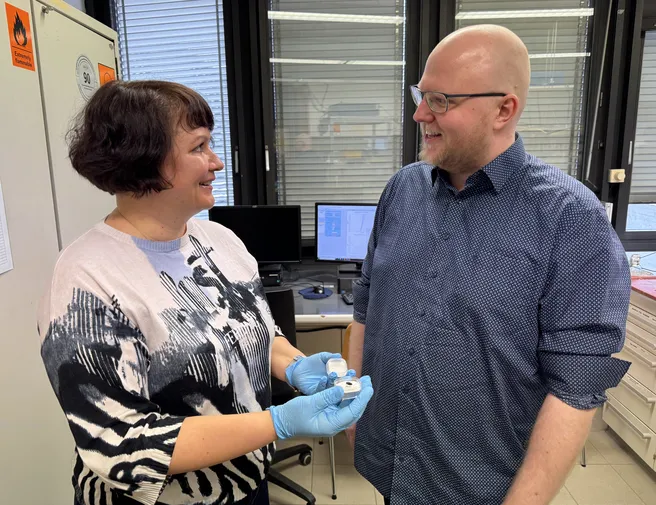In a study published in December 2024, TUM Prof. Aliaksandr S. Bandarenka, Dr. Elena Gubanova and their team used experimental techniques to reveal the formation of surface defects on palladium under electrochemical hydrogen evolution reaction conditions. The observations align with theoretical insights from collaborators at Universities of Limerick and Bochum, who attribute the defect formation to particular interactions between palladium and hydrogen atoms. The study was published in Advanced Materials and significantly improves our general understanding of how to design stable and active palladium-based electrocatalysts to produce green hydrogen for the future.
Green hydrogen is made through water electrolysis. This process can be facilitated by using electrocatalysts, which accelerate electrochemical reactions. The prevalent state-of-the-art catalyst for the hydrogen evolution reaction is platinum, a noble metal that is very expensive and scarce. For that reason, one must explore other catalyst materials and identify suitable alternatives. Besides platinum, palladium is well-known as a promising candidate for producing hydrogen. Nevertheless, any catalyst material can be optimized to improve its properties. In doing so, one should understand the material behavior under reaction conditions of the hydrogen evolution reaction to design an efficient catalyst. And that’s exactly what the team was able to accomplish.
In accordance with the Climate Change Act amendment, Germany has agreed to reduce net greenhouse gas emissions by 65% of 1990 levels by 2030 and reach greenhouse gas neutrality in 2045.1 One important contribution to achieving this goal relies on the replacement of fossil fuels with renewable energy. The electricity produced from these renewable sources can be used to synthesize green hydrogen, which exhibits a large gravimetric energy density of 33.6 kWh/kg,2,3surpassing gasoline and diesel (12.7 and 12-14 kWh/kg, respectively)3,4. Therefore, it can be employed in hydrogen fuel cell vehicles and for energy storage. Further, hydrogen is a chemical that is required for many industrial processes, for example, oil refining, chemical production, and fertilizers, but renewable green hydrogen is less than 5% of global production.
Publication
- “Hydride-Induced Reconstruction of Pd Electrode Surfaces: A Combined Computational and Experimental Study” in Advanced Materials: https://advanced.onlinelibrary.wiley.com/doi/10.1002/adma.202410951 DOI: https://doi.org/10.1002/adma.202410951
Participating research groups
- Prof. Bandarenka’s Physics of Energy Conversion and Storage research group https://www.ph.nat.tum.de/energy/ecs/
- Dr. Gubanova’s Nanostructured Energy Materials research sub-group https://www.ph.nat.tum.de/energy/sub-group-nanostructured-energy-materials-dr-gubanova/
References
1 https://www.bundesregierung.de/breg-en/service/archive/climate-change-act-2021-1936846
2 C. Tarhan and M. A. Çil. ‘A study on hydrogen, the clean energy of the future: Hydrogen storage methods’. In: Journal of Energy Storage 40 (2021), 102676.
3 rmi.org/run-on-less-with-hydrogen-fuel-cells/
4 M. J. Veenstra and B. Hobein. ‘On-board physical based 70 MPa hydrogen storage systems’. In: SAE International Journal of Engines 4.1 (2011), pp. 1862–1871.
Acknowledgements
This project has received funding from the European Union’s Horizon 2020 research and innovation program under Grant Agreement HERMES No. 952184, and from the German Research Foundation (DFG) Collaborative Research Centre 1625.
Co-authors include research teams at the University of Limerick (IE), Aalto University (FI), Université Grenoble Alpes (FR), Ruhr University Bochum (DE), and Helmholtz Institute Erlangen-Nürnberg for Renewable Energy (DE).
Scientific Contact
Dr. Elena Gubanova
Press Contact

